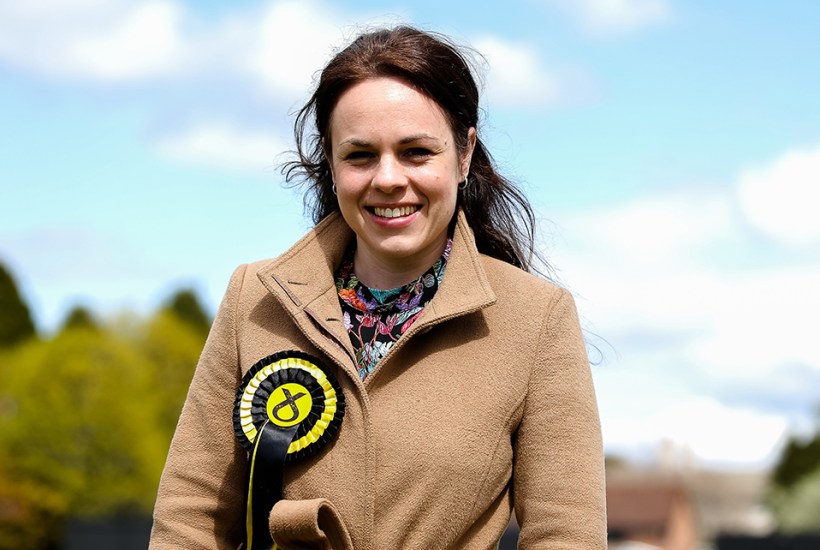It seems as if Kate Forbes is about to achieve the remarkable distinction of losing an election as a result of a policy which she has not advanced and has no intention of enacting. It wasn’t she who raised the issue of gay marriage this week, but those who interviewed her after she announced her intention to stand in the Scottish National party leadership contest. Would she disavow the views of her church on sex, marriage and abortion? She would not. Her supporters peeled away.
Just like the old Test Act, where Scots in public life had to swear they held no Catholic beliefs, a new test is emerging for would-be party leaders. Anyone religious is expected to distance themselves from ‘problematic’ doctrine: this isn’t about what they would do, but what they think. Those from traditional Christian, Muslim or Jewish backgrounds risk effectively being barred from leadership if they follow their family’s faith. This means exclusion in the name of diversity – a new glass ceiling.
Forbes failing the purity test leaves the field clear for Humza Yousaf. Yousaf is an observant Muslim but he has passed the secular inquisition by making clear that he dis-agrees with Islamic teaching on gay marriage. His record is worse than any health secretary ever to sit in Edinburgh: more than a third of A&E patients weren’t seen within the four-hour target in December, despite A&Es being quieter than in the same month pre-pandemic. Waiting lists for hospital treatment are at record highs too, but strangely little interest is being shown in the fact that the Scottish health service is imploding on his watch.
Yousaf also presided over the collapse in NHS Scotland’s emergency service in 2021, when ambulances were taking an average of more than six hours to arrive. To compound the problem, Yousaf told the public to ‘think twice’ before calling an ambulance – deterring desperately ill people from seeking help. Drugs deaths in Scotland remain at three times the level of any other European country – an embarrassment for a man who advocates a ‘progressive’ drugs policy based on harm reduction rather than criminalisation.
Prior to becoming health secretary, Yousaf served as justice secretary. He drew up the Hate Crime and Public Order Bill, which proposed to make ‘stirring up hatred’ a criminal offence even in private conversation. In its original form it could have made satire of religion – or even disapproval of gay marriage – punishable with up to seven years in jail. What amounted to ‘hate’ was to be based on the perception of an individual who felt targeted, and there was no need on the part of the prosecution to prove intent. The bill was eventually passed only after numerous revisions.
While minister for transport, Yousaf received six penalty points for driving a car on which he was not insured. He once criticised Rangers players for singing a sectarian football chant without taking the time to find out the video was fake. While Nicola Sturgeon was careful, assured and a convincing stateswoman, Yousaf’s record is one of rushing to judgment and trying to make up with enthusiasm what he lacks in competence.
With Forbes in charge, unionism could be in serious danger. As a confident finance secretary, who succeeded in handling a budget speech on the same day she was thrust into the job following the sudden resignation of her predecessor, she commands a respect well beyond her party, included among committed unionists. The almost certain suppression of her ambitions will weaken the appeal of independence. The SNP will once more draw its support and its representatives from among the usual metropolitan liberals.
Despite Forbes’s personal views on gay marriage and abortion, she has respected the democratic process and accepted that the views of the majority must prevail. It is her detractors who try to assert that there are issues over which reasonable people cannot be allowed to disagree; that there are commonly held views (many of which were majority views until a few years ago) that are beyond the pale.
In succumbing to the cancel culture which governs so much of everyday life, the SNP has weakened itself, perhaps fatally. The party has always suffered from not knowing quite what it stands for, united only by the demand for independence. This week it had the opportunity to show there is more to it than narrow nationalism. It appears to have blown this chance.
The SNP movement – it’s far more than a party – depends on having a leader who is able to run a campaign as well as a government. Sturgeon was struggling to do this after the Supreme Court rejected her plan to hold a referendum this year, and she quit having run out of road. With Yousaf, the SNP will continue with a failing formula. The Tories ought not to celebrate as this, as it will likely mean two dozen nationalist seats heading to Labour at the next election. But the SNP’s loss is very much the Union’s gain.
Got something to add? Join the discussion and comment below.
Get 10 issues for just $10
Subscribe to The Spectator Australia today for the next 10 magazine issues, plus full online access, for just $10.
You might disagree with half of it, but you’ll enjoy reading all of it. Try your first month for free, then just $2 a week for the remainder of your first year.














Comments
Don't miss out
Join the conversation with other Spectator Australia readers. Subscribe to leave a comment.
SUBSCRIBEAlready a subscriber? Log in